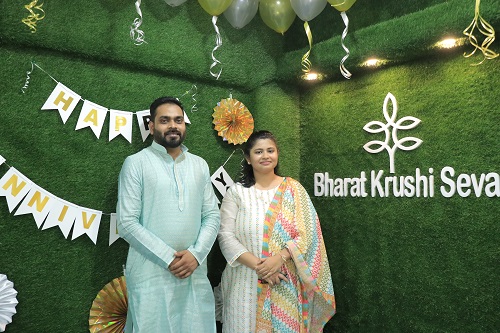Bharat Krushi Seva (BKS) an Agritech started in July 2021 with a mission to drive mass adoption of digital agriculture across India has raised INR 43 million in its first round of seed funding from marquee investors, namely S. Amit Group, Upaya Social Ventures, Villgro, Criyagen Agri and Biotech, Mintosh Advisory & SiriusOne Capital. The Funds would be utilized for the enhancement of the technology and expanding into new geographies. Currently BKS has catered to over 2 lakh plus farmers across Maharashtra and with this new seed funding, will reach out to a further 2 lakh farmers making a positive impact in their lives.
“BKS has a vision to touch the lives of 5 million farmers in the next four years as a part of their “Mass Adoption of Digital Agriculture” campaign. I firmly believe that technology can make a huge difference in the lives of farmers and with our tech-based platform we envision making the lives of farmers easier and self-dependent,” said, Sharayu Lande, Founder and CEO, Bharat Krushi Seva.
“While agriculture in India has problems such as fragmentation, inefficiencies, and climate vagaries, it also brings with it infinite possibilities to create sustainable big businesses. With scientific and data driven advisory being at its very heart, Bharat Krushi Seva is passionately building a comprehensive tech-based platform to profitably solve such complex issues and help each and every farmer grow more sustainably. We are truly excited to be part of this venture, what we can only classify as, our fulfilling journey,” said Lead Investor Mr. Amit Mehta, S Amit Group.
“Despite their crucial role in feeding the world, most smallholder farmers are desperately poor and deeply vulnerable to the changes that are affecting our climate. Upaya is excited to partner with Bharat Krushi Seva to give farmers the information and tools they need to increase productivity in an increasingly challenging environment,” said Kate Cochran, CEO, Upaya.
“BKS is bringing substantial value-add to the smallholders farmers in Maharashtra through their technology based Business-to-Farmer (B2F) platform. The uniqueness of BKS platform combined with trust and affordability that multiplying quality in the farm supply chain and increasing production efficiency further reaffirmed our view that the company is on the right track and creating financial impact in the life of the smallholder farmer,” said Mohammad Azhar, Lead Government & Public Sector Initiatives at Villgro.
“We believe agritech has the potential to solve some of the biggest challenges that the agriculture industry is facing today. We are excited to invest in this highly promising start-up and support the highly passionate founders,” said Shailendra Mruthyunjayappa, Lead Investor, Mintosh Advisory & SiriusOne Capital.
“We have made a strategic investment in Bharat Krushi Seva in our quest to develop the agritech ecosystem. These investments are essential for the growth and sustainability of the agriculture industry and prosperity of the farming community,” said Basavaraj Girennavar, Chairman and Managing Director, Criyagen Agri and Biotech.
One of its flagship products, the Automated Weather alerting system, keeps farmers informed about the changing weather conditions and delivers-farm-specific, crop-specific and crop-stage specific actionable recommendations to farmers to reduce the loss in the yield.
“We have delivered More than 5000 products till date to the doorsteps of the farmers. Our local level supply chain network of retailers and dealers helps farmers get just in time delivery at their doorstep ensuring quality brands and reduction in damage of stocks too,” said Hemant Dhole Patil, Founder and COO, Bharat Krushi Seva.
BKS aims their solutions will help farmers grow a quality yield, extend shelf life and get a better market price through farm sourcing via institutional buyers directly. This will also result in lesser wastage of food. It is not only the social and economic impact that BKS helps a farmer with, but the environment too. Suggestions by BKS have resulted in farmers saving nearly 40 percent of their total expenditure with an increase in the total yield by 20-30% of optimal quality and nutritional value with minimal use of fertilizers and pesticides.

